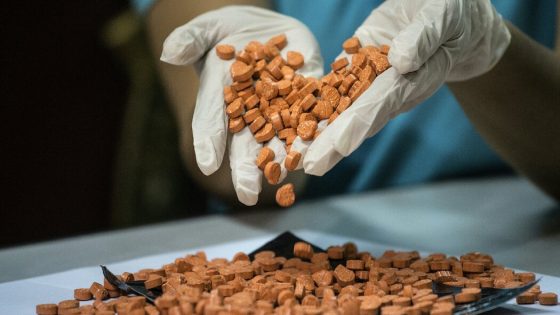The Food and Drug Administration on Friday raised concerns about the health effects of MDMA as a treatment for post-traumatic stress disorder, citing flaws in a company’s studies that could pose major obstacles to approval of a treatment anticipated to help people struggling with the condition.
The agency said that bias had seeped into the studies because participants and therapists were readily able to figure out who got MDMA versus a placebo. It also flagged “significant increases” in blood pressure and pulse rates that could “trigger cardiovascular events.”
The staff analysis was conducted for an independent advisory panel that will meet Tuesday to consider an application by Lykos Therapeutics for the use of MDMA-assisted therapy. The agency’s concerns highlight the unique and complex issues facing regulators as they weigh the therapeutic value of an illegal drug commonly known as Ecstasy that has long been associated with all-night raves and cuddle puddles.
Approval would mark a seismic change in the nation’s tortuous relationship with psychedelic compounds, most of which the Drug Enforcement Administration classifies as illegal substances that have “no currently accepted medical use and a high potential for abuse.”
Research like the current studies on MDMA therapy have corralled the support of various groups and lawmakers from both parties for treatment of PTSD, a condition affecting millions of Americans, especially military veterans who face an outsize risk of suicide. No new therapy has been approved for PTSD in more than 20 years.
“What’s happening is truly a paradigm shift for psychiatry,” said David Olson, director of the U.C. Davis Institute for Psychedelics and Neurotherapeutics. “MDMA is an important step for the field because we really lack effective treatments, period, and people need help now.”
Amy Emerson, the chief executive of Lykos Therapeutics, said the company stood behind the data and the design of its studies, which were developed in consultation with F.D.A. staff members.
“These are not easy study designs; they are very complicated,” she said.
“Functional unblinding,” in which study participants can determine whether they’ve been given a placebo, often influences research on psychoactive medications because patients are acutely aware of the effects, she said.
A rejection of the application would shake the nascent field of psychedelic medicine, which has been drawing millions of dollars in private investment. Much of that backing has been predicated on the approval of MDMA therapy, which the F.D.A. granted breakthrough therapy designation, or fast-track review, in 2017.
The agency has given the same designation to four other psychedelic compounds, including psilocybin “magic mushrooms” for depression and an LSD-like substance for generalized anxiety disorder.
The criminalization of psychedelics, set in motion by the Nixon administration in the 1970s, effectively killed research on a variety of psychoactive compounds that until then had been showing significant therapeutic promise.
MDMA in recent years has captivated scientists, mental health professionals and patients moved by anecdotes and data suggesting that the drug, when paired with talk therapy, can produce significant improvements in a range of psychiatric conditions, among them anxiety, depression, substance abuse and eating disorders.
The drug is not, strictly speaking, a classic psychedelic like LSD or psilocybin. In its pure form, MDMA is considered an empathogen or entactogen, meaning it increases an individual’s feeling of empathy and social connectedness. But illicit versions of the drug bought for recreational purposes are often mixed with other drugs, increasing the risk of adverse effects.
With the exception of its potential cardiac risks, MDMA has a well-established safety profile and it is not considered addictive by many in the field.
The F.D.A. generally follows recommendations of its advisory panel, and the agency is expected to reach a formal decision by mid-August. But even if it were approved, the agency could heed the advice of its staff and outside experts by imposing strict controls on its use and require additional studies to assess its effectiveness as a treatment.
The last two studies that Lykos submitted to the F.D.A. examined about 200 patients who underwent three sessions — eight hours each — where about half were given MDMA and half were given a placebo, according to a report published in Nature Medicine. In each session, the patients who got MDMA were given an initial dose of 80 to 120 milligrams, followed by a dose half as strong about two hours later. The sessions were four weeks apart.
Patients also had three appointments to prepare for the therapy and nine more in which they discussed what they learned.
The most recent drug trial found that more than 86 percent of those who received MDMA achieved a measurable reduction in severity of their symptoms. About 71 percent of participants improved enough that they no longer met the criteria for a PTSD diagnosis. Of those who took the placebo, 69 percent improved and nearly 48 percent no longer qualified for a PTSD diagnosis, according to the submitted data.
“It’s easy enough to point out cracks in the study, but there is no doubt that MDMA is helping a lot of people with PTSD,” said Jesse Gould, a former Army Ranger who runs Heroic Hearts, an organization that helps veterans access psychedelic treatments, most often outside the United States. “With no other drugs in the pipeline and with 17 to 22 veterans killing themselves each day, we desperately need new treatment options.”
The F.D.A. has scheduled nearly two hours for public comment on Tuesday, most likely giving a platform to a vocal group of MDMA study participants and researchers who have highlighted what they describe as ethical breaches and pressure to report positive results during clinical studies conducted by MAPS Public Benefit Corporation, which this year changed its name to Lykos Therapeutics.
Approval, if granted, would probably be nuanced. The drug was studied during therapy sessions attended by a psychotherapist and a second therapist who attended for safety, given the vulnerability of patients. The F.D.A. staff analysis proposed some restrictions upon approval, including administering the drug in certain health care settings, monitoring of patients and tracking of adverse effects.
One recent example of such an approval is Spravato, a ketamine nasal spray that the F.D.A. requires to be given by certified providers in a medical setting followed by two hours of monitoring.
In a letter, the American Psychiatric Association urged the F.D.A. to take a measured approach. Dr. Jonathan Alpert, chairman of the group’s research council, said doctors were concerned that agency approval could give rise to fringe treatments by untrained practitioners.
To prevent that, the agency’s approval “must be accompanied by rigorous regulations, strict prescribing and dispensing controls, comprehensive patient education, and ongoing monitoring and surveillance systems,” according to the letter signed by Dr. Saul M. Levin, the association medical director and chief executive.
If MDMA is approved, federal health authorities and Justice Department officials would have to follow certain steps for the drug to be downgraded from a Schedule 1 controlled substance, akin to the process now underway with cannabis. The D.E.A. might also set production quotas for the drug ingredients, as it does with stimulant medications used to treat ADHD.
The F.D.A. records released Friday note that “participants appear to experience rapid, clinically meaningful, durable improvement in their PTSD symptoms.”
.
The agency staff analysis released on Friday echoed concerns raised in recent months. In March, the Institute for Clinical and Economic Review, a nonprofit that examines the costs and effectiveness of medications, issued a 108-page report questioning Lykos’s study results and deeming the effects of the treatment “inconclusive.”
The report noted that some study participants told ICER that ideology shaped study outcomes, influenced by a close-knit community of therapists interested in psychedelics to report good results. Some said they felt they would be shunned if they did otherwise.
ICER also described the studies as small and possibly biased by about 40 percent of participants having previous experience taking MDMA — far more than the general population. Lykos has countered the criticism, saying the figure reflects the reality that PTSD patients, desperate for relief, often seek out unregulated treatments.
ICER also cited misconduct reported by Meaghan Buisson, an early trial participant. A video of Ms. Buisson’s session with two therapists, a married couple, suggested inappropriate contact.
“The severe PTSD that brought me into this clinical trial went unaddressed and unresolved,” Ms. Buisson said during a meeting of ICER advisers on Thursday. “All they did was pour a concrete foundation of new traumas over the top.”
MAPS, the original trial sponsor, addressed the matter in 2019 and again in 2022, saying it reported the “ethical violation” to the F.D.A. and health officials in Canada, where the conduct occurred.
In an interview Thursday, Ms. Emerson, the chief executive of Lykos, acknowledged the pain Ms. Buisson experienced but said that rejection of the company’s application could produce greater risks given the growing number of people taking illicit drugs or seeking MDMA therapy at underground clinics.
“The voices of people who have been hurt need to be heard without anybody being defensive,” she said. “But people are desperate for treatments, and pushing MDMA outside of a regulatory pathway is likely to create more harm.”
No matter which way the F.D.A. rules, specialists in the field of psychedelic medicine say there is no turning back, given the mounting trove of promising research and the broad public and political support that has accompanied and buoyed its rise.
Bob Jesse, a longtime researcher who helped set up the psilocybin team at Johns Hopkins University over 25 years ago, recalled the days when most researchers hid their interest in psychedelic compounds for fear of damaging their careers.
“Psychedelics are now passing the giggle test,” he said. “A remarkable thing about this moment is that while there are people criticizing aspects of some of these studies, you have to look hard to find people who are opposed to the substances on the basis that they psychedelics.”
Source Agencies



